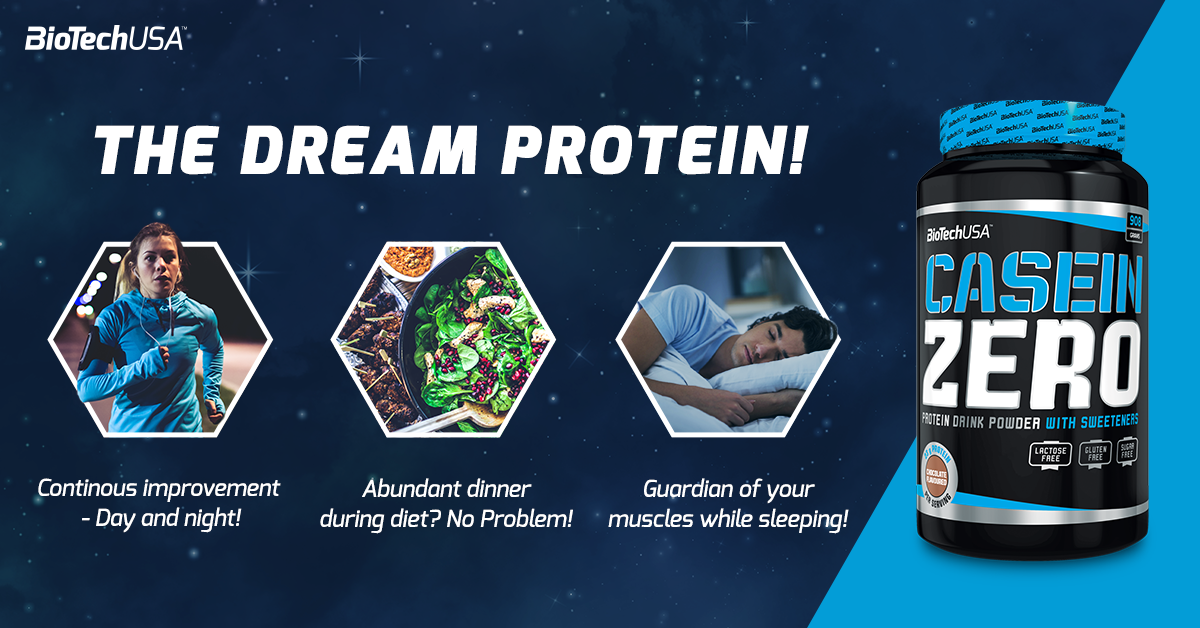
Why consume protein before bedtime

The importance and role of consuming proteins is now undoubted, either in sports or everyday life. Protein plays a number of highly important roles in our body, but as athletes, we mostly study it from the point of view of building and maintaining muscles. Protein shakes are a popular way of taking in proteins, and justly so. They’re easy to mix with water or milk in a shaker and ready to drink. A protein shake can contain whey protein or casein, it can be beef protein, but it can also contain other than animal protein. You can also find an alternative among plant-based protein shakes if you’re allergic to any component of milk or you don’t consume animal-based products. Moreover, these shakes are flavoured very deliciously, so they’re also a great choice for a dessert when you happen to be on a diet. However, protein consumption is not only recommended while building muscles. It’s also useful when you want to lose weight, as it helps to maintain your muscle mass, which makes you tight and toned, and you can also burn more calories through your muscles. But why should you consume protein before bedtime?
Why drink protein before bedtime if you want to lose weight
When you want to lose weight, the most important thing is to control your evening meals. What you consume before bedtime in the form of carbohydrate and fat can’t be used up during the night, since you won’t be moving. That’s why it’s particularly important to take in useful nutrients at this time, which won’t deposit as excess in your fat reserves. The best solution is to choose some protein source, if you don’t want to overload your digestive system, to take in unnecessary extra calories, and you want something delicious. A protein shake is a great solution to all of these. Also, you should choose some slow-absorbing protein powder such as casein.
The amino acid content of a slow-absorbing protein source ensures your body the necessary supply for all night.
And that’s great, because during the long period of sleep catabolic processes in your muscles may begin. Since muscle tissues are unnecessary for your body, because they need a lot of calories, they will be the ones to be broken down first, not fat reserves, which your body feeds on during times of ‘starvation’. However, if you feed your muscles with amino acids, your body will rather rely on your fat reserves to break them down and use their calorie content as night fuel. In the case of protein shakes, calorie calculation is also a piece of cake, since the packaging indicates the exact amounts among the nutrients. It’s also great when you want to satisfy your craving for sweets. But if you don’t want anything sweet, instead of a protein shake we recommend chicken breast or turkey breast, roasted, egg white, and for a side dish, a some vegetables and low-fat cottage cheese, which you can eat as a salty or even a sweet cream. Proteins also make you feel full, so you won’t feel hungry.
Protein for muscle growth
An obvious condition of muscle growth is to consume sufficient protein, since muscles are nothing else but protein. They are built of amino acids, which you can supply through your protein intake. If you don’t consume enough protein, your muscles, injured by workout, won’t be able to recover, which can have a number of effects. On the one hand, your muscles won’t grow, on the other hand, you’ll be exhausted, and also your immune system may considerably weaken and you’ll be more susceptible to infections. Proteins have a number of further roles in your body besides these; for example, the safe functioning of organs requires a daily protein intake of at least 0.5-1 g/body weight kg. Whether you’re a recreational or a competitive athlete, you need even larger amounts to support your muscle recovery and reach your goal – progress. The mechanism of muscle building is not complicated. Basically, you need to load your body to the extent which forces your muscles to adapt, that is, greater than what it would like to bear in the first place. That’s only possible through intensive, sufficiently hard training. To make it work, you’ll need to supply your body with the right nutrients. The process of recovery itself is, in fact, the recovery, adaptation and growth of your muscles, to get your body prepared for the next, perhaps even greater stress. It will only happen if you ensure the necessary amino acid supply.
Since you don’t eat or drink during the night, you need to take in slow-absorbing protein sources before bedtime to supply your body with nutrients all night long. Such are, for example, casein or egg white.
How much protein to take in
An average adult needs about 1 g / bodyweight kg protein a day. In the case of a person weighing 70 kg it means 70 g, which can be easily ensured through the daily consumption of meat, dairy products, maybe supplemented with eggs. An athlete needs more than that, 2 or even 2.5 g / bodyweight kg, which is rather difficult to ensure from solid foods. That’s where one or two protein shakes a day can be of great help. One of them should definitely be consumed after workout. You can drink the other shake for your breakfast, or even in the evening, before bedtime, for the above reasons. After workout, you should choose a faster-absorbing protein shake, such as whey protein, and for the evening you should go for a slow-absorbing one, such as casein or egg white. Athletes’ protein needs may also vary depending on the type of sport they do and their goal. An endurance athlete needs less, whereas a strength athlete or one for whom muscle growth is important – such as a bodybuilder – needs more protein. Nevertheless, regardless of the sport you do or the goal you’ve set, taking in protein before bedtime is definitely a crucial condition of progress.
Recommended protein sources
From among solid nutrient sources, before bedtime cottage cheese or maybe egg white, also available in a bar form, are definitely recommended. If you don’t want to bother with all these, you should choose some slow-absorbing protein such as the much-mentioned casein.
Tip: Try BioTechUSA’s Casein Zero, now available in 6 fantastic flavours!
Normally, it has a pudding-like consistency, so it can even make a nice evening meal in itself. You can mix it with water or milk to get a delicious drink. If your goal is mass gain, you may as well boost it with some carbs, for example, oats. Fruits and nuts can also add a lot to the taste. If you have whey protein at home, which is a fast-absorbing protein, it can be useful to slow it down with some milk or cottage cheese. Another great idea for mass gain is to mix a serving of chocolate-flavoured protein powder with some frozen banana and almond milk in a blender. If you want fruity flavours, mix a box of cottage cheese and 100 g blueberry with a serving of vanilla-flavoured protein shake powder.
If you’d prefer solid nutrient sources, we recommend roasted tilapia with grilled vegetables, pearl barley and yoghurt dressing.
Generally speaking, it’s a great misbelief about evening meals that they should be avoided, especially that you shouldn’t eat anything after 6 pm. Why 6 pm? What if you follow a totally different daily routine? So you’d better forget about this, and instead, concentrate on supplying your body with the necessary nutrients which can also be useful during a night’s ‘fasting’. What does all that mean? Avoid simple carbs and fatty foods. Instead, choose complex carb and protein sources – in the case of the latter, go for slow-absorbing ones. During a diet, it may as well be vegetables with eggs or meat; we recommend chicken breast, turkey breast or sea fish. You may also opt for an easy-to-prepare and easy-to-digest protein shake, in itself or mixed with cottage cheese.
